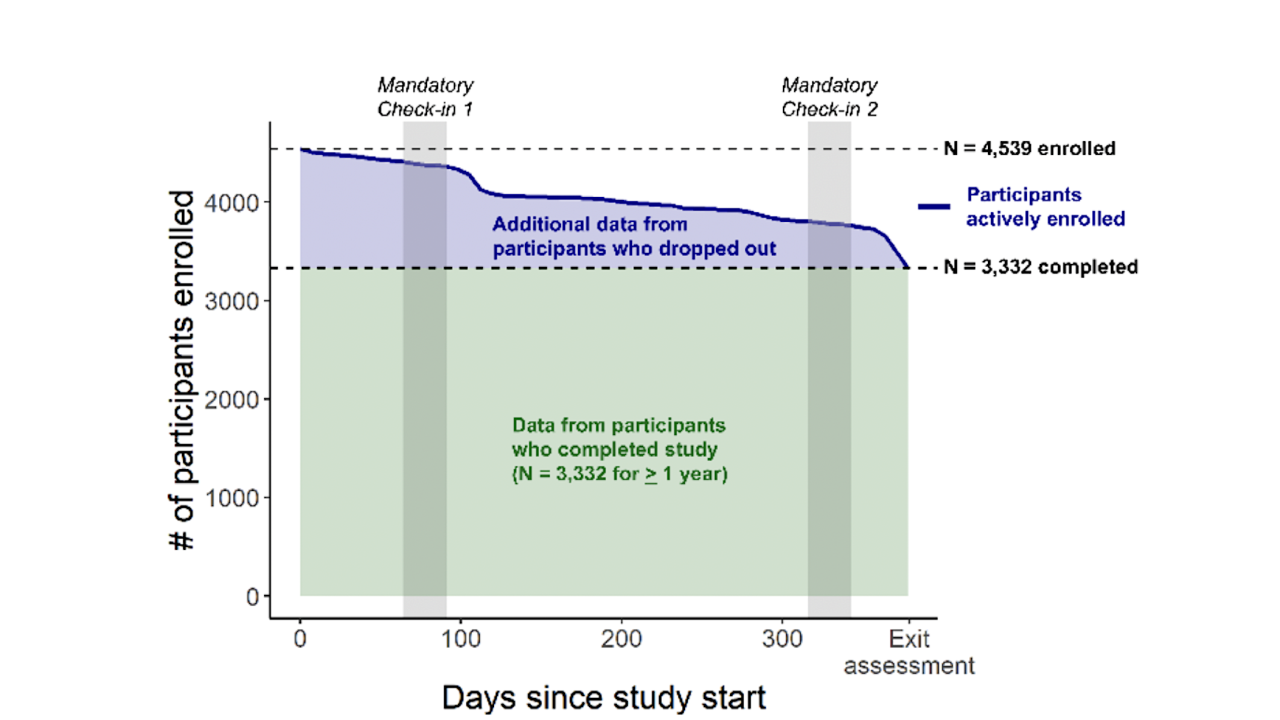
A preprint protocol article describing the design and implementation of the landmark Digital Mental Health Study was posted on medRxiv on Oct. 1, 2025 and has been submitted for publication in a peer-reviewed journal. Senior authors of this protocol article from UCLA include Nelson Freimer, MD, UCLA Depression Grand Challenge director and DMHS principal investigator; Michelle Craske, PhD, DGC co-director.
The DMHS, conducted in collaboration with Apple, launched in 2020 with the goal to identify the relationship between depression and anxiety symptoms and objective measures of sleep, physical activity, heart rate, facial expressions, time in daylight, and other functions gathered by digital sensors in iPhone and Apple Watch with participants’ consent. Such objective measures could more precisely characterize the physiological, behavioral and emotional components of depression and anxiety, which may aid in developing more effective treatments, predicting patient outcomes and understanding the underlying causes of these conditions. The DMHS remains the largest and longest study of its kind to date.
This preprint marks the first publicly released, in-depth description of the DMHS. It describes the foundational work of the DMHS, including two preceding pilot studies; study design and infrastructure; recruitment strategies to enroll a large and diverse sample of participants; and adapted assessments intended to improve self-report data and minimize participant burden.
The protocol paper supports future publications anticipated to demonstrate novel associations between a wide range of data types and a set of assessments that were more extensive and more frequently obtained than those in previous digital mental health studies. These discovered associations, in turn, may contribute to more precise and objective frameworks for characterizing mental health symptoms and defining mental health disorders.
Researchers screened more than 17,000 individuals and enrolled more than 4,500 participants, who provided informed consent to continuously share each data type collected through their personal devices over a 12-month period. More than 3,300 of them participated for a full year. Researchers captured continuous streams of objective measures referenced above alongside other measures from surveys, interviews and audiovisual journals.
Early study findings demonstrated high participant engagement and morale. More than 70% of participants completed the study and most participants followed study requirements — including those with more severe symptoms. The authors posit that these early findings demonstrate the value of large-scale digital sensing for mental health research — using objective measures of behavioral and physiological changes related to mental health could set a new and improved standard for how mental health is measured, assessed and treated.
To read the full preprint, visit medRxiv.
Why are protocol papers shared?
Protocol articles are published to share best practices and promote accountability, transparency, and coordination between researchers. Subsequent articles detailing comprehensive research findings are later submitted to and published in peer-reviewed journals.
What is a preprint?
Research papers are often shared as open-access preprints to accelerate the sharing of findings with the scientific community, since the traditional peer-review process can delay publication by a period of months or years.
Senior authors: Nelson Freimer*, Marian Stewart Bartlett^, Michelle G Craske*
First authors: Christopher Douglas*#, Eliza Congdon*, Crane Huang^, Darsol Seok*
Co-authors: Zachary Cohen*#, Samir Akre*, Veronica Tozzo*, Feiyang Huang*, Danielle Ramo-Larios^, Raphe Bernier^#, Jonathan Flint*, Arash Naeim*, Brunilda Balliu*, Alex AT Bui*
* Indicates UCLA DGC-affiliated authors
^ Indicates Apple-affiliated authors
# Indicates primary or secondary appointment at another institution (Douglas now at Washington University in St. Louis, St. Louis, MO, Cohen now at University at Arizona, Bernier now at University of Washington, Seattle, WA)
